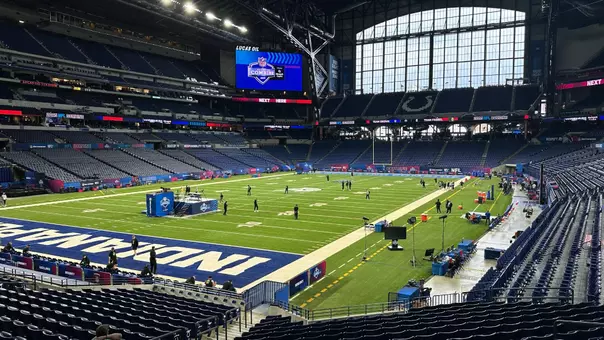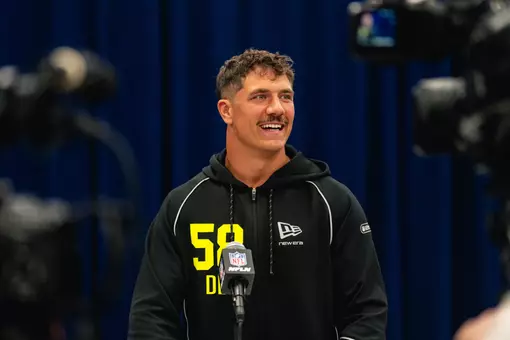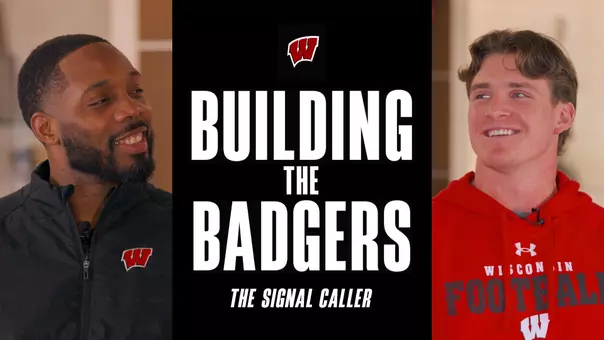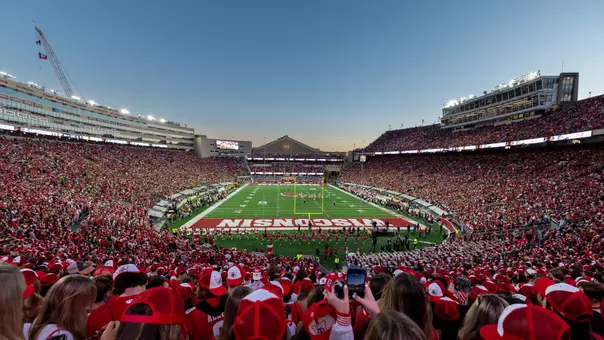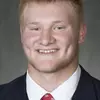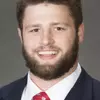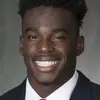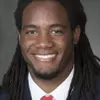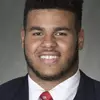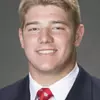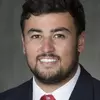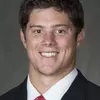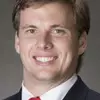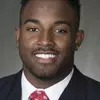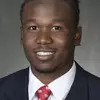Baggot: Heart of the Action
September 16, 2017 | Football, Andy Baggot, Varsity Magazine
A view of the game from up close — the noise, the speed, the strategy. Joining the Wisconsin football team on its sideline during a game at Camp Randall takes you straight into the heart of the action.
 |
||
|
BY ANDY BAGGOT
UWBadgers.com Insider
MADISON, Wis. — At first glance, you couldn't tell if Wisconsin sophomore quarterback Alex Hornibrook had made a mess or just cleaned one up.
He jogged to the bustling home sideline at Camp Randall Stadium wearing a blank stare. After a brief verbal encounter with UW coach Paul Chryst, Hornibrook removed his helmet, carefully set it down at the end of a metal bench and turned his gaze to the massive video board at the north end of the facility.
You couldn't be sure if Hornibrook had just made a big play or a big mistake because he wore an expression any World Poker Tour participant would love.
"I don't try to do that," he said. "That's just how I am."
Intentional or not, Hornibrook's demeanor is a reflection of how the Badgers typically go about their business on the sideline during games.
No two personalities are exactly alike and everyone on has their own emotional trigger mechanisms — players and coaches — but you can't help but be struck by the sense of energetic calm that pervades the UW bench.
That was one of the takeaways from watching the first two non-conference games of the regular season — a 59-10 win over Utah State on Sept. 1 and a 31-14 victory over Florida Atlantic on Sept. 9 — from the home sideline.
Intentional or not, Hornibrook epitomizes the even-keeled approach employed by the 10th-ranked Badgers.
That aforementioned display? It came immediately after he'd thrown a 12-yard touchdown pass to senior tight end Troy Fumagalli, part of a 31-14 win over Florida Atlantic.
But Hornibrook struck the exact same pose a series later when his pass intended for wide receiver Quintez Cephus was intercepted by defensive end Leighton McCarthy.
"You never want to be too low or too high," Hornibrook explained. "Not too excited, angry or frustrated."
2-0. #OnWisconsin
— Wisconsin Football (@BadgerFootball) September 9, 2017
Watching from the Wisconsin bench is not the best vantage point for play-to-play perspective — obstructed viewing at its worst thanks to all the big bodies — but the tradeoff is that you hear, notice and feel so much more than you might seated in the press box or Section T.
It starts during pregame warmups.
You hear Florida Atlantic's drills dictated by an air horn instead of a customary coach's whistle; the voices of family members and friends calling out to UW junior kicker Rafael Gaglianone from behind the spectator railing; the loud inhale of sophomore inside linebacker Chris Orr as he takes a jolting whiff of an ammonia capsule.
You notice multiple NFL scouts walking the sideline scribbling into their notebooks; former Badgers such as Vince Biegel, Lance Kendricks and Bart Houston shaking hands and reconnecting; UW assistant coaches surreptitiously filing onto the sideline away from the hubbub of players charging from the tunnel.
You feel the whistle of an airborne football zinging by your ear as Hornibrook warms up with a student manager amid a crowded bench; the sense of solemn dignity from watching junior tailback Chris James and true freshman cornerback Madison Cone kneel alone in reflection; the violent pop of every collision, especially those nearest the sideline.
Chryst has served UW in four different capacities since 1985 — player, assistant coach, offensive coordinator and head coach — and has seen a variety of sideline conditions. He's come to embrace a minimalistic theme.
There are no elaborate props on his sideline, no billboard-like posters to signal in plays (like numerous college spread offenses) or trash cans to inspire defensive players to create turnovers.
Chryst has a two-man crew — redshirt freshman quarterback Karé Lyles and student manager Bobby Dunn — using hand gestures to signal in plays from the bench. In an age where many coaches have play sheets the size of Sizzler menus, Chryst's looks like it fits into the palm of his hand.

Chryst has played for or worked with five UW head coaches — Dave McClain, Jim Hilles, Don Morton, Barry Alvarez and Bret Bielema — and also been an assistant in the NFL and CFL. Each stop offered Chryst some insight into his current vision.
"I've been on different staffs, different teams where it's been a different feel," he said. "I don't think you try to orchestrate it necessarily, but there is a certain rhythm.
"Too often coaches can create a panic that isn't healthy, that doesn't help the kids."
Chryst said games are for his players to go and have fun and maximize their gifts.
"I want game day to be theirs," he said.
"I don't care where they're at, on game day people need to be themselves. With coaches, your job on game day is to help them play, to be eyes and communicate and (make) decisions to help them play. You have to do it within your personality."
Those details come to life as the game unfolds.
You hear offensive coordinator Joe Rudolph, on one knee, calmly addressing the offensive line after an opening series vs. Utah State in which Hornibrook was sacked twice; Rudolph continuing to lecture in a steady, even tone after a poor exchange between Hornibrook and redshirt freshman center Tyler Biadasz results in a lost fumble; Rudolph, on his feet now, getting agitated after a subsequent three-and-out, saying, "I've seen enough. Do your jobs."

You notice Biadasz, sitting in the middle of his teammates, never taking his eyes off Rudolph; the UW bench erupt — the loudest blast of emotion during either game — when junior inside linebacker T.J. Edwards intercepts a pass vs. Utah State, setting up a field goal that tied the game at 10; Edwards, one of the emotional leaders for the Badgers, coming from the other end of the sideline to encourage the offensive linemen before the 49-point second half began.
You feel the unmistakable sense of anticipation from the crowd whenever true freshman tailback Jonathan Taylor takes a handoff and pinballs into the clear; the genuine look of joy on Chryst's face as he hugged sophomore wide receiver Quintez Cephus following his first career TD catch vs. Utah State; the urgency in Chryst's voice when, on third-and goal from the Florida Atlantic 4 late in the third quarter, he bellowed "Finish this!"
Jim Leonhard, the first-year defensive coordinator for the Badgers, said the calm nature of the sideline is driven from two directions.
"Some of it is the personality of the players and some of it the personality of the coaches," he said.
"Our players are pretty relaxed. We try to get across to them that you get to the sideline and you just have to correct. You have to figure out, 'OK, this is how they're attacking us. These are the issues that we're having.'
"Communicate it. Talk it over and try to take as much of the emotion out of it as possible.
"If they need a little bit of fire, yeah, you have to bring the intensity and get the focus back. But the majority of the time, on the sideline, that's the time to think. It's not time to scream. It's not time to yell."

That approach was evident after Florida Atlantic scored on a 63-yard pass play. Junior cornerback Nick Nelson let wide receiver DeAndre McNeal zoom past him thinking he had safety help when he should have been in man-to-man coverage. Quarterback Daniel Parr made the Badgers pay.
"We have to talk out there," Leonhard told his charges in the secondary, his voice even, but firm.
An even-tempered discussion, led in part by junior strong safety D'Cota Dixon, ensued.
"To me, yelling at guys does not help that," Leonhard said. "It gets them even more in a panic like things are going on. I try to be as calm as possible."
The UW defense is situated on benches opposite the offense. Separating them are a communication outpost and a sports medicine area complete with a collapsible examination tent.
Most of Chryst's assistants are on the sideline, including Rudolph, Leonhard, Ted Gilmore (wide receivers), John Settle (running backs), Chris Haering (special teams), Inoke Breckterfield (defensive line) and Tim Tibesar (outside linebackers).
Bob Bostad (inside linebackers) and Mickey Turner (tight ends) operate from the press box.

Leonhard noted that Breckterfield and Tibesar have similar personalities to him as far as "let's just address the issues and give the players time (to regroup)."
Leonhard said it was a lot different when he starred for Wisconsin as a three-time All-American at safety from 2002 to '04.
"The personality of the coaches was so different and a lot of the (secondary) coaches I had, they were up in the box.
"So much of it is just the personality of your coach and what his mindset is."
When Chryst was the UW offensive coordinator from 2005 to '11 he was up in the press box and would touch base with his quarterbacks between series.
Now, Chryst said he'll talk with Hornibrook or true freshman backup Jack Coan on the sideline if he feels it necessary.
"I look at him as much as anything and see if I need to," he said. "It's either validating what they're seeing or clearing things up," he said.
Standing on the sideline, you get a whole new perspective on watching UW chase another Big Ten Conference title.
You hear the appreciation of fans rain down.
You notice all the moving parts necessary for success.
You feel "Jump Around" in a whole new way.
Hornibrook said there's more to come from the Badgers.
"We still want to get some intensity on the sidelines," he said, "and that will come with making plays."


